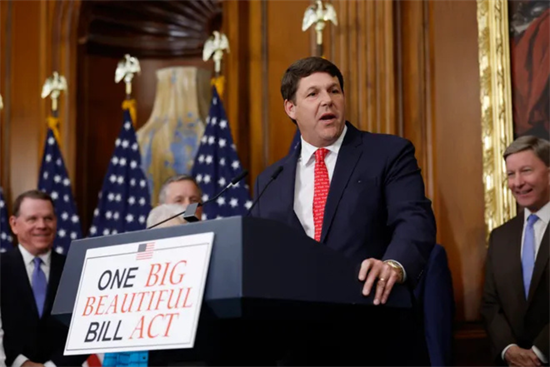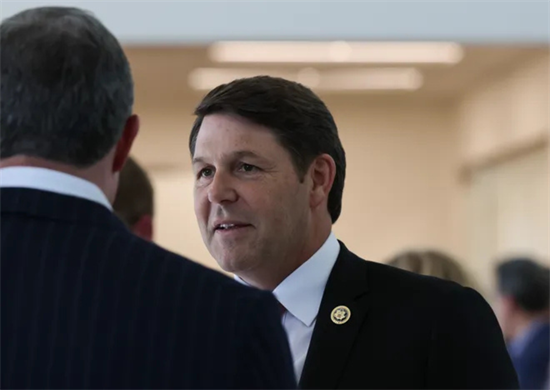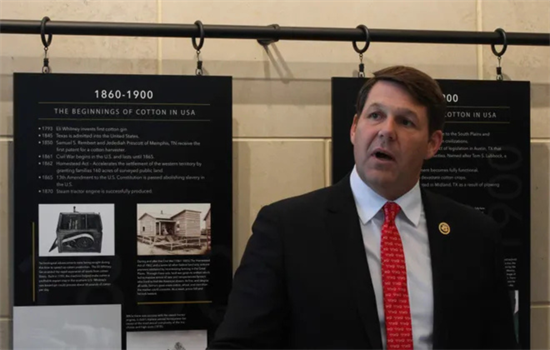In the News
Arrington reflects on wins, potential impact of the 'One Big Beautiful Bill' on rural America"I could spend another decade in Congress and not achieve all that we have put in this one bill"
Washington,
May 30, 2025
Arrington reflects on wins, potential impact of the 'One Big Beautiful Bill' on rural America"I could spend another decade in Congress and not achieve all that we have put in this one bill"By Mateo Rosiles May 30, 2025 AS SEEN IN THE LUBBOCK AVALANCHE-JOURNAL The One Big Beautiful Bill has been part of the national discourse since its recent passage in the U.S. House, with the potential to make substantial changes and set national policy.
The bill's architect — House Budget Committee Chairman Jodey Arrington, R-TX — says it comes from platforms and ideas he has run on in his West Texas district, but just set at a national level. Sitting in his downtown office in Lubbock, Texas, Arrington reminisced on his most recent triumph with the bill in the House, which still has a journey to make through the Senate before it lands on President Trump's desk. "It's one thing to try to broker the policies in this big reconciliation bill, but then getting the votes to pass it and threading that needle has been a very rewarding challenge, but probably the biggest challenge of my career, politically," Arrington said. The bill passed the House 215-214 on May 22 with the smallest GOP margin that the House has seen in the last 100 years.
Another thing he hasn't done, even when attending college, is sleeping for 14 consecutive hours, which he did after the House vote. But Arrington said he wouldn't have it any other way.
"I could spend another decade in Congress and not achieve all that we have put in this one bill," Arrington said. "I've done some things one off, but (not) all at one time. It is truly the most consequential legislative endeavor in generations post World War II." The bill has pulled the Congressman away from his district and constituents as he had to usher the bill through the House process with a sense of urgency. It is set to impact border security, welfare reform, tax reform and much more, while being aimed at cutting $1.7 trillion in federal spending. However, several other items in the bill are not gaining much attention but could potentially have a greater impact on the health and survival of rural Americans and farmers. Giving rural hospitals, communities a second chance
Before the bill was voted on by the whole House, the House Ways & Means Committee allowed four of Arrington's smaller bills to be included in the big bill — one of them was the Second Chances for Rural Hospitals Act. The act expands on a COVID-era initiative Congress passed by allowing it to work retroactively. Prior to 2020, rural hospitals had to maintain a certain number of inpatient beds to maintain the designation of a Critical Access Hospital to receive federal funding. This was expensive for rural hospitals, causing them to close nationwide. In 2020, Congress created the rural emergency hospitals (REH) designation, which allowed open rural hospitals to reconfigure their cost structure. "We gave the freedom and flexibility to determine how many beds, if any, they wanted to keep inpatient, and that they could turn their hospital to a rural emergency hospital," Arrington said. "A rural emergency clinic and an outpatient clinic, so they could stabilize patients and then move them to the bigger hospitals in the population centers."
Arrington said the REH designation has actually helped out across the nation, saving two rural hospitals in his district in Anson and Crosbyton, Texas, and 36 rural hospitals nationwide. According to the Texas Organization of Rural & Community Hospitals (TORCH), there are four REH hospitals in Texas as of 2024.
Once passed, the included act would retroactively allow two additional previously closed rural hospitals in Texas and 30 rural hospitals nationwide to have a second chance at serving their communities.
"I have more rural hospitals in my district than any district in Texas," Arrington said. "If you can't provide basic care to these communities, they're going to have a hard time being sustainable and it affects our ag community, affects our farmers and ranchers or energy producers."
According to the TORCH, since 2010, 20 rural hospitals have closed in Texas and 120 rural hospitals have closed nationally as of 2025. Additionally, there are 156 rural hospitals serving four million Texans.
But it's not the only thing Arrington ensured was in the reconciliation bill that will directly impact West Texas and rural communities nationally and their economics. Protecting the 'heart' of the Farm Bill, agricultural producers
"We put the big Farm Bill fix in this reconciliation bill," Arrington said.
He accomplished this by fixing the farm safety net, which has not changed as the price of fuel, seeds, fertilizer, and other input costs increase, making the bill "inadequate." If passed by the Senate, the farm safety net would see an investment of $56 billion.
For context, according to the U.S. Department of Agriculture, the farm safety net is a collection of price mitigation policies to help support and protect farmers and producers when crops fail, the economy isn't the best, and when natural disasters strike.
There is no Farm Bill currently, as the previous bill expired. Congress has been using stopgap measures to help continue sections of it throughout the current year, which Arrington says is ineffective and wasteful of taxpayer money.
"If we can get (the bill) through the Senate and make it the law of the land, the heart of The Farm Bill, the meat of the Farm Bill, will have been already established," Arrington says.
This would allow Republicans and Democrats to hash out policies that stem from the Farm Bill that fall under its overarching branches: conservation, rural development, and agricultural science and research. This, in turn, would hopefully produce a Farm Bill faster as many farmers and ranchers anxiously await its arrival.
What's next for the One Big Beautiful Bill?
The bill is headed for the Senate, which hasn't set a date as to when the bill will be brought forward for debate or vote, but Republican leadership is looking to have the bill land on President Donald Trump's desk by July 4.
However, Arrington said the hardest part of the process on the One Big Beautiful Bill is done, but he will still be in Washington indirectly overseeing that the bill gets through the Senate with its minor edits and tweaks to the policies the House has drafted for review. "I will not rest and I won't be satisfied until the America First policies that are wrapped up in this reconciliation bill are the reality for my fellow Americans and the people I represent in West Texas," Arrington said. |






